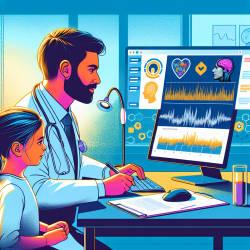Understanding the Research
The research underscores the importance of using psychophysiological measures, such as event-related potentials (ERPs), to monitor and predict the onset of neuropsychiatric disorders post-TBI. Key objectives include:- Identifying TBI as a significant risk factor for neuropsychiatric disorders.
- Introducing ERP researchers to instruments for characterizing TBI, post-concussion syndrome, and psychiatric disorders.
Implementing Research Outcomes
Practitioners can leverage the research findings to improve their diagnostic and therapeutic approaches. Here are some practical steps:1. Comprehensive Patient Assessment
A thorough patient assessment is crucial. This includes collecting detailed demographic information, combat exposure history (for military personnel), and categorizing injury severity using established scales like the Glasgow Coma Scale (GCS) and the Mayo Classification for TBI Severity.2. Utilizing Standardized Instruments
Incorporate validated instruments to assess post-concussion symptoms and psychiatric disorders. Recommended tools include:- Rivermead Post-Concussion Symptoms Questionnaire (RPQ) for current post-concussion symptoms.
- Symptom Checklist-90-Revised (SCL-90-R) for psychiatric symptoms.
- Beck Depression Inventory (BDI) for depression.
3. ERP Integration
Utilize ERPs to gain deeper insights into the patient's cognitive and emotional state. ERPs can help in identifying subtle changes in brain function that may not be evident through behavioral assessments alone.Encouraging Further Research
The research highlights the need for ongoing studies to refine patient characterization protocols and improve the predictive power of psychophysiological measures. Practitioners are encouraged to stay updated with the latest research and consider participating in studies to contribute to the growing body of knowledge.Conclusion
By integrating the outcomes of this research, practitioners can enhance their diagnostic accuracy and therapeutic effectiveness for patients with TBI and post-TBI psychiatric disorders. This approach not only improves patient outcomes but also advances the field of neuropsychiatric assessment.To read the original research paper, please follow this link: Patient Characterization Protocols for Psychophysiological Studies of Traumatic Brain Injury and Post-TBI Psychiatric Disorders.










